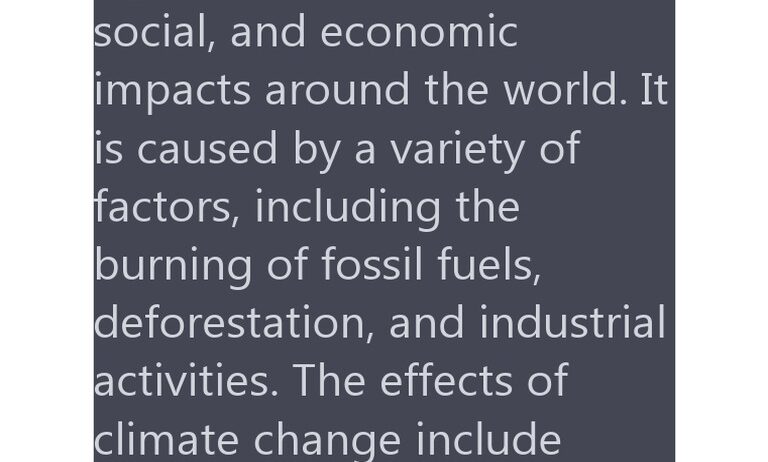The discourse surrounding climate change often elicits a range of opinions. Some argue that it should remain a personal concern, relegated to the domain of individual action and lifestyle choices. However, the reality is that climate change is an unequivocal governmental issue, interwoven with the very fabric of public policy, economic stability, and global security. A multi-faceted examination reveals why government intervention in climate change is not only rational but essential in addressing this pressing global crisis.
Firstly, the enormity of climate change necessitates a comprehensive response that transcends individual capabilities. While personal actions—such as recycling, reducing energy consumption, and supporting sustainable practices—are vitally important, they are not sufficient to counteract the vast challenges that climate change poses. Greenhouse gas emissions, for instance, are largely the result of industrial activity, energy production, and transportation systems, which are predominantly controlled by governmental policies and regulations. This highlights the crucial role that governmental agencies play in instituting standards and enforcements that can lead to substantial reductions in emissions.
Moreover, the international ramifications of climate change further underscore its nature as a governmental issue. Climate change is inherently global, defying national boundaries and necessitating coordinated action. The ramifications of rising temperatures—such as extreme weather events, sea-level rise, and alterations in agricultural productivity—affect nations collectively, creating a universal imperative for collaborative solutions. International agreements, such as the Paris Agreement, epitomize the necessity for governmental action, establishing commitments among nations to limit global warming and reduce carbon emissions. Thus, the need for governments to engage with each other in addressing the crisis is apparent, demonstrating that this is not merely an issue for citizens but an urgent priority for governance.
The economic implications of climate change further bolster the argument for government involvement. The potential costs associated with climate change—whether through damage to infrastructure from extreme weather events, healthcare costs related to pollution, or the economic impacts of disrupted supply chains—are staggering. Conversely, integrating environmental considerations into economic planning can yield significant financial benefits. Investments in renewable energy, energy efficiency, and sustainable practices not only create jobs but also stimulate economic growth. Therefore, a governmental approach that prioritizes climate-resilient policies enhances both ecological preservation and economic advancement.
Furthermore, social equity is a compelling consideration in the climate change narrative. Vulnerable populations, such as low-income communities and marginalized groups, are disproportionately affected by environmental degradation and climate-related disasters. These groups often lack the resources to adapt or recover, highlighting the moral imperative for governments to act. By addressing climate change through legislation and public policy, governments can prioritize social equity, ensuring that all populations receive the support needed to combat the adverse effects of climate change. This is not merely a question of environmental stewardship; it is also one of justice and equity, illuminating the profound interconnections between social issues and environmental policy.
The public health implications of climate change evoke yet another layer of complexity that reinforces the necessity for governmental action. The contamination of air and water, exacerbated by climate change, poses significant health risks, including respiratory ailments, cardiovascular diseases, and heat-related illnesses. Governments possess the authority to enact regulations that address these health risks, implement public health initiatives, and allocate resources to safeguard community health. Therefore, as custodians of public welfare, governments must take an active stance in mitigating climate change to protect the well-being of their citizenry.
Critically, the inertia surrounding climate change may stem from a lack of political will, an outcome often influenced by vested interests and lobbying from industries resistant to change. Yet, this reinforces the need for governmental intervention in climate policy. By establishing robust frameworks for environmental regulations, governments deter detrimental practices and incentivize sustainable alternatives. A decisive shift is necessary; it calls for governments to lead and legislate boldly in the face of climate inertia, thereby creating a paradigm shift in how societies across the globe interact with their environment.
Moreover, the role of education in fostering awareness and understanding of climate change cannot be overstated. Governmental agencies can spearhead educational initiatives and campaigns that inform the public about the empirical realities of climate change, its consequences, and the necessary actions to mitigate it. By cultivating informed citizens, governments can galvanize collective efforts, fostering an electorate that prioritizes environmental sustainability in their personal and civic lives. This educational approach aligns with the broader goal of creating a more environmentally literate society that is engaged with the urgent realities of climate change.
Ultimately, addressing climate change as a governmental issue is not merely about policy enforcement or economic incentives; it is about fostering a holistic framework that recognizes the interconnectivity of human existence and the natural world. The undeniable reality is that climate change will continue to threaten both the stability of nations and the health of their citizens if left unchecked. Therefore, the imperative is clear: a comprehensive, coordinated governmental response is not optional, but essential for the preservation of both our planet and future generations.
In conclusion, the observation that climate change affects all facets of society signals that it is indeed a governmental issue. The multifarious implications—economic, social, public health, and environmental—underscore the need for robust government action. By collectively mobilizing resources, creating policies, and fostering international cooperation, governments worldwide can initiate the profound changes necessary to combat climate change. As the Earth’s climate continues to shift, it is our collective responsibility to ensure that our governance reflects the urgency of this crisis, highlighting that climate change is not merely an environmental concern; it is a clarion call for transformative governance that prioritizes sustainability and equity.







